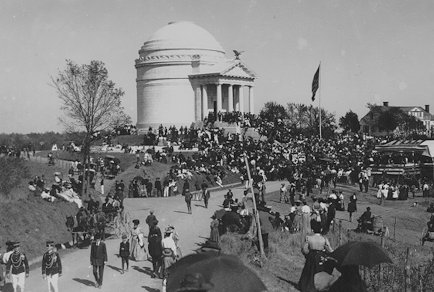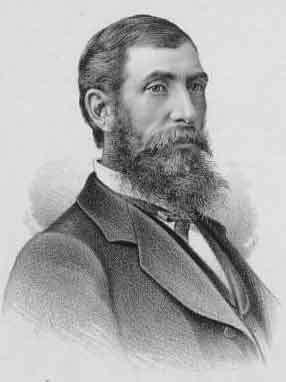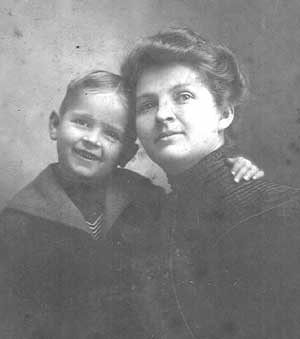Matilda Champion:
"I was in the
Cellar During the Fight"
By
Rebecca Blackwell Drake
On October 26, 1906, Matilda Champion attended the dedication of the Illinois Monument in Vicksburg as a special guest of the State of Illinois. During the day’s events, she revealed answers to many of the lingering questions regarding the Battle of Champion.
Photograph courtesy of the National Park Service On Saturday, October 26, 1906, Matilda
Champion, age 79, woke up excited about the day in store. She dressed in
her finest clothes, donned her hat and then called for her carriage
driver to hitch up the horses. Soon she was on her way to Edwards
Station to catch the train to Vicksburg where she had been invited by
the State of Illinois to be an honored guest at the dedication of the
Illinois Monument.
Matilda, the widow of Sid S. Champion,
Confederate veteran, considered the invitation to be a wonderful honor.
As the train rumbled westward she focused her thoughts on the historic
event that lay ahead.

|
The train stopped at several stations before reaching the entrance to the Military Park and opening its doors. Suddenly, the cars crowded with passengers became a bee-hive of activity. Granville B. McDonald, a veteran of the 30th Illinois Infantry, was one of the passengers. As McDonald moved forward, he overheard the conductor addressing an elderly lady as "Mrs. Champion." The name aroused his curiosity since, almost a half a century before he had fought in the Battle of Champion Hill. Could this possibly be the woman who owned the property where he had fought?
McDonald approached the petite old lady and politely asked, "Are you the Mrs. Champion that lived on the battlefield?" Matilda answered, "Yes sir, I am the woman." Amazed that he had come across the owner of the property where so many of his fellow soldiers had fought and died, McDonald asked, "Were you there during the fight?" Matilda replied, "Yes I was. I was in the cellar." Matilda then added that while trapped in the cellar she held her two-year-old son, Sid Champion II, in her arms but that he had since died of yellow fever.
After the chance meeting with McDonald, Matilda continued on to the dedication of the Illinois Monument which was one of the largest events ever to take place in the Vicksburg Military Park. Thousands of veterans and guests came from all over the United States to witness the dedication of the most impressive monument on the Vicksburg battlefield. The imposing structure was modeled after the Pantheon in Rome and was dedicated to the 36,312 Illinois soldiers whose names were inscribed on bronze plaques in the rotunda. It was a day to remember.
Several weeks after the dedication, Matilda received a letter from the Illinois Military Park Commission expressing their appreciation for her attendance at the event and requesting her picture which would be featured in an upcoming book: "My dear Mrs. Champion: Our commission is very nearly ready to publish a book entitled 'Illinois at Vicksburg' and we are very anxious to have a photograph of yourself to be used in the publication. All of us felt so highly honored to have you with us on that occasion that we feel the story of 'Illinois at Vicksburg' would not be complete without your picture as our most distinguished guest." Matilda complied with the request.
One has to wonder what could have transpired for Matilda between the years 1863 and 1906 for her to receive such recognition from the State of Illinois. Perhaps the answer is simple. During the Battle of Champion Hill, the soldiers from Illinois (Logan’s Division) and Indiana (Hovey’s Division) bore the brunt of the battle, many falling to their death on the bloody hillside near Matilda’s home. The house was quickly converted into a Union hospital where surgeons performed amputations and tended to the wounded and dying, both Blue and Gray. Since Matilda was home during the battle, it is reasonable to think that she might have met and helped to treat some of the wounded soldiers from Hovey’s and Logan’s divisions.
|
After the war, Matilda endeared herself to veterans from the North as they returned to visit Champion Hill - all wanting to visit the battlefield where so many of their comrades had fought and died. Some even came on behalf of their families, asking to exhume the remains of their fallen sons so they could be laid to rest at home. For over three decades, Matilda welcomed all who came with open arms.
As the years passed, Matilda bore her own burdens of sorrow. Life had been difficult since the war, beginning with the death of her eight-year-old son Balfour in 1867 followed by her husband’s death in 1868. At the age of forty-one, she was left a widow with three young children. Mary Elizabeth, her oldest child and only daughter, eventually married and left home but was rarely heard from again. By the turn of the century, Matilda’s two remaining sons had died - Sid Champion II, a member of the Mississippi Legislature, and Wallace Champion, a medical doctor who practiced in Hinds County. Sid II died during the 1897 yellow fever epidemic and Wallace, who had suffered from poor health since medical school, died in 1901. In the end, all Matilda had left was her young grandson, Sid Champion III, and the land known as Champion Hill.
As the veterans from the North visited and corresponded with Matilda, they discovered the brilliance and charm of the mistress of Champion Hill - a woman who had endured so many hardships as a result of the war. In 1878, W. H. Welman from New Albany, Indiana, wrote: "For your many kindnesses to me when I came to remove my Brother’s remains 12 years since, I am very grateful. No multiple of years that may be allotted to me will erase from my memory the nicely prepared meal, tendered with that kindness eminating [emanating] only from Noble Women……"
Charles M. Parker, whose arm had been amputated on the grounds of Matilda’s house, told Matilda that he had spent one month at her home (Union hospital), before returning north. He recalled the many amputation tables that were used by the surgeons: "I do not know just where your extension table was used. There were many operating tables. I should think more than twenty. I can remember seeing several from where I lay - they were out under the trees in the shade - tho some were in the house."
|
Another veteran, W. A. Oliphant, vice president of the Alaska Gold Mining Company based in Indianapolis, wrote and apologized for the part that he had played in the destruction of the Champion plantation: "My very dear friend, Your letter is in hand and I am glad to know that you are still living for I know that the world is better off with you in it. I remember still your kindness to me in other days and it pains me exceedingly to know that I was a party to the destruction of your beautiful plantation….."
As the years passed, Matilda embraced all who wrote and visited, proving once and for all that she was indeed the Grand Dame of Champion Hill. When she passed away on December 18, 1907, she left behind a box filled with letters written to her by her husband during the Civil War. Intermingled amongst the letters were: signed photo cards of generals Grant, Logan and Hovey; a calling card from Mrs. John A. Logan; letters from veterans from the North; and the letters from the Illinois-Vicksburg Military Park Commission inviting Matilda to be their honored guest at the dedication of the Illinois Monument. From the contents of the box, it was apparent that Matilda had come full circle since the beginning of the war.
At the time of her death, Matilda was survived by her nine-year-old grandson, Sid Champion III. Sid became the keeper of the Champion family treasures, including all of the old letters and memorabilia that his "Grandmother Matilda" had tucked away under her bed for safekeeping.
Historic Source: Matilda Montgomery Champion’s collection of letters and The Battle of Raymond and Jackson by G. B. McDonald, Sparta News, Sparta, Illinois, 1916. McDonald’s first-hand account of the conversation with Matilda Champion is the only true source as to where Matilda was on the day of the Battle of Champion Hill. Olivia Montgomery Champion, daughter-in-law of Matilda Champion, verified Matilda’s account of having been in the cellar during the battle. Olivia, wife of Sid II and mother of Sid III, was very close to Matilda and undoubtedly she heard the story straight from Matilda. If anyone knew the truth, it was Olivia Champion since it was her husband who had been the baby in Matilda’s arms during the Battle of Champion Hill.
| Home | Grant's March | Pemberton's March | Battle of Champion Hill | Order of Battle | Diaries & Accounts | Official Records |
| History | Re-enactments | Book Store | Battlefield Tour | Visitors |
Copyright (c) James and Rebecca Drake, 2007. All Rights Reserved.


